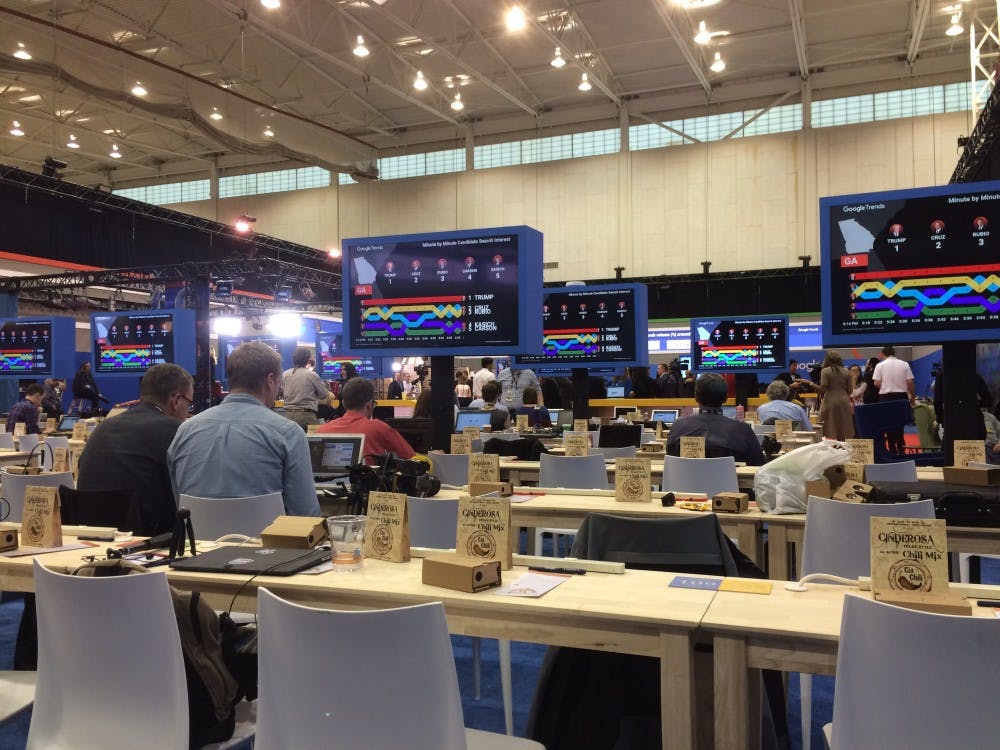UH administration extols benefits of debate publicity, but students divided

The University of Houston hosted a heated debate between five contenders for the Republican Party presidential nomination on Feb. 24. UH administrators argued that the debate helped the university gain national recognition, though some students and the student newspaper expressed concerns regarding the event’s impact on students.
The debate, which was broadcast on CNN and Telemundo, was watched by 14.5 million Americans, according to Politico. The event was the 10th Republican debate and the last before Super Tuesday, when many states held primaries.
According to the Daily Cougar, UH’s student newspaper, there were about 800 seats in UH’s Moore Opera House, where the debate was held; however, the university was given only 25 of those tickets to distribute, and ultimately just six UH students were able to attend through a raffle, out of over 40,000 total in the university.
The Daily Cougar argued in two separate editorials in February that the debate was detrimental to students due to the exclusivity and demands on university resources. Large amounts of parking space had to be cleared for the event, several streets were closed and some classes were canceled, according to the Houston Chronicle.
“The party may be in your house, the guests may be parking in your spot, the invitation sent straight to your inbox, but you can’t really go in,” the Daily Cougar’s second editorial stated. “After this week, university activities will go back to normal. We get one week in the national spotlight, which is great, but again, how does this help students?”
In a blog post, UH President Renu Khator said the administration had hoped for more tickets and worked to find ways to include students. A small number of additional students were given an opportunity to attend by volunteering to help at the event.
“We knew that tickets will be limited, but ‘25’ was a much lower number than I was ready to hear,” Khator said.
David Kochinski, president of the UH College Republicans, told the Dallas Morning News that the opera house location made it clear from the start that seats would be limited.
“The university gave a lot of opportunities for students to be involved with the debate process [through] volunteering [and] focus groups and panels,” Kochinski said. “We are disappointed that not everyone can get a ticket but we understand why.”
Keith Kowalka, UH’s assistant vice president for student affairs, said the debate would help students since the national media exposure would open new opportunities away from Houston.
“The more recognition, the more prestige your university has, it will certainly have a direct impact on your degree,” Kowalka said.
On the afternoon of the debate, a large crowd of protesters including UH students gathered outside the event perimeter. Lara Aracely Hattab, a UH student, said the nature of the candidates was another point of concern.
"I'm sure the fact we hosted the debate gave our school a certain historical importance, but it also created an incredibly uncomfortable atmosphere for many, especially minorities and marginalized groups of people who are directly and negatively affected by the policies encouraged and being discussed by such candidates," Hattab said.
Inside the opera house, the debate itself had no disruptions. In their first editorial, the Daily Cougar acknowledged that an increased number of attendees could lead to a more unruly atmosphere while questioning the closed nature of the event.
“We understand the need to limit the possibility of protests or interruptions,” the editorial stated. “But what’s the point of having a debate at a university if students aren’t allowed to participate?”
More from The Rice Thresher

Rice welcomes 7.8% of applicants to class of 2029
Rice accepted 2,852 applicants to the class of 2029 March 26, said Yvonne Romero, vice president for enrollment. This represents 7.8% of 36,777, the highest acceptance rate since 2022.

Engineering school celebrates 50th anniversary, invites students, alumni and speakers
The George R. Brown School of Engineering invited engineering alumni, students and faculty to celebrate its 50th anniversary March 28-29. The event, which took place in the Engineering Quad, included speakers, a drone show, alumni gatherings and other social events like mixers.
Student store offers discounted merch to students
Select merchandise from the Campus Bookstore will now be available to students for a discounted price, according to an Instagram post by the Student Association in collaboration with the Campus Bookstore. Each month, designated “spirit items” will be offered at a 10% discount. For the month of March, the selected merchandise was two blue Rice T-shirts.


Please note All comments are eligible for publication by The Rice Thresher.